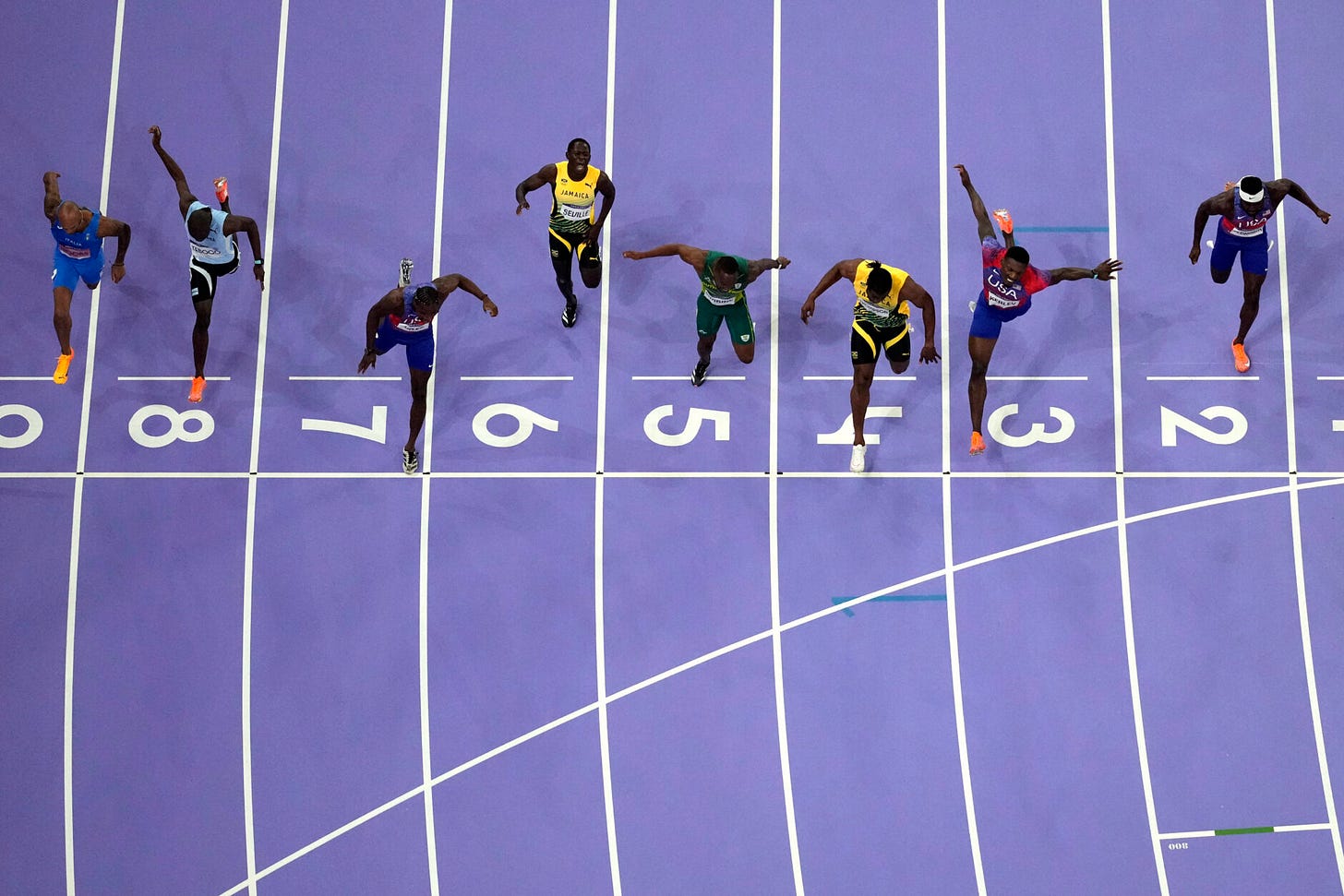On August 4, 2024, Noah Lyles electrified the world by winning the 100-meter race at the Paris Olympics in 9.79 seconds. 🏃🏻 He beat Kishane Thompson by just 0.005 seconds in one of the closest finishes ever!
Remarkably, even the slowest runner in the race clocked 9.92 seconds, a time faster than Carl Lewis's 1984 Olympic-winning 9.99 seconds.
Today's slowest is better than the fastest from when we were kids!
While advancements in training and technology play their part, the biggest driver of this evolution is the runner’s mindset—a dynamic mix of growth mentality and personal ambition. 🧠⚡️
This mindset isn't exclusive to athletics. By embracing these principles, we can unlock new levels of success and fulfillment in both life and work. Here's how:
Compete against yourself, not others
"The only one who can tell you 'you can't win' is you, and you don't have to listen."
–Jessica Ennis-Hill
Runners always talk PB (personal best). True progress lies in surpassing your own benchmarks rather than chasing others. In your career, focus on improving past performances—whether by refining a product or honing your skills.
In startups, this means innovating beyond the last iteration, while in your career, it's about embracing projects that stretch your capabilities and push you to new heights.
Set your own rules
"You have to set your goals before you start, and once you do, you have to be relentless in achieving them."
–Michael Johnson
I’m a morning person, but getting up at 6 a.m. after the occasional late night isn't easy. So when the alarm rings, I have two choices: get up or give in.
If I go to bed knowing I have a morning run, I wake up immediately. The "going back to bed" option doesn't exist on running days. It’s a self-asserted rule, and it saves me the energy of mustering willpower.
On non-running days, it's different—I often turn off the alarm and go back to sleep. I'm working to change this habit, and until my rule becomes "wake up no matter what," I'll keep struggling. It's all about the rules you set for yourself.
Athletes train tirelessly because they abide by self-imposed rules, like waking early for a run regardless of circumstances. This commitment is crucial for consistency.
In the workplace, prioritize tasks that align with your goals, resisting external pressures to conform. Real success stems from staying true to your standards and creating habits that support your aspirations.
Balance speed and patience
"To give anything less than your best is to sacrifice the gift."
–Steve Prefontaine
It’s now established that to run fast, you need to train at a slow pace also for a longer time. Training in Zone 2, which is slow running improves your aerobic capacity. It ultimately improves your speed by increasing your VO2 max.
Runners understand the value of both sprinting and pacing. In life, you must alternate between urgent tasks and thoughtful reflection.
Whether you're upgrading your skills or navigating daily challenges, balance is key. Embrace opportunities for fast-paced growth and slow, deliberate improvement to thrive in your field.
Running alone versus running with friends
"Running is a road to self-awareness and reliance–you can push yourself to extremes and learn the harsh reality of your physical and mental limitations."
—Doris Brown Heritage
Years back, I joined a group of marathon pacers who were training themselves for upcoming runs. Marathon pacers are the runners who help other runners finish their runs within their goal times. Running in a group is so much easier and more fun.
Each group has runners of different ages, sex, and experience. The one thing that binds them to a group is their pace. On their runs, one runner would be responsible for playing music, another would keep track of the route, and another would make sure the team stays hydrated. Everyone has different roles but they are all aiming at the same finish time.
In the startup world, the entire journey from idea to market is full of hustle. The hustle becomes slightly easier and a lot more exciting if you are a team. A team with a mix of hard and soft skills—one person good at building, another good at selling. Someone with a lot of experience, another who’s a newbie. A team with varied skill sets but a common vision for the product.
A team with a common vision runs together, keeps each other pumped, and finishes strong. Whether you start as friends or not, you cross the finish line as friends.
Break the frame
"Others will absolutely be able to break 2:00, too, as long as they believe in themselves.”
— Eliud Kipchoge
Roger Bannister shattered the 4-minute mile barrier, proving that mental limits are often self-imposed. His achievement exemplifies the Bannister Effect: believing in the impossible makes it possible.
Challenge your mental barriers to unlock potential, whether you're changing careers, learning a new skill, or launching a venture.
Embrace possibility, and you'll inspire others to follow suit.
"No human is limited."
—Eliud Kipchoge






Runner mindset 💪⭐
“Runner’s Mindset”. Definitely a powerful tool to achieve life goals.